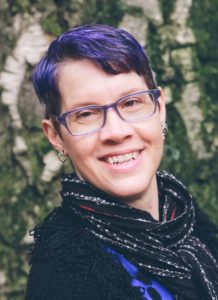Deanna Hagy
Interview and article written by Daniella Marchick

Deanna Hagy became aware of the need for additional support for those who are dying and their communities when a dear friend passed away unexpectedly at age 39. Her response was to study about death and dying. “In my studies I learned about how death denial, as a culture, does us a disservice and actually creates more traumatizing death experiences and about how there are so many gaps in support for folks around End-of- Life (EOL).” Currently, Deanna offers her services as an End-of-Life Doula at Portland based Evening Star End-Of-Life Doula Services.
What do you wish people knew about End-of-Life Doulas?
“That we exist!” End-of-Life Doulas (also known as death doulas, death midwives, soul midwives, to name a few) can work with individuals throughout their dying process through supportive conversations, partnering with family members, and medical professionals. We meet people where they are, help them clarify their values, and then provide the tools, resources and education to have their EOL experience align with those values. We can work with healthy folx who are planning, all the way through diagnosis, disease progression, and through death. As healthcare teams may change as a disease progresses, we are the constant support.
We want folx to know that a few conversations with a doula when a medical shift happens can fundamentally change the end of life experience. We can help to open the door for emotional movement and healing all the way up to the last breath. Because death is just one moment, all the rest is living, and we support people in getting the most out of that living time that they can.
If you could wave a magic wand and have everyone understand something about the end of life experience what would you like to share?
“Not dealing with it or talking about it does not make it go away or cause death to happen.” Ignoring the fact of it only serves to create chaos, confusion, pain, and an even potentially harder grieving process for your people after you’re gone. Deanna shared that she and her doula partners see so much healing happen when folks have open, honest conversations about what means the most to them, what they would want at the end, as well as addressing issues from the past that need further resolution. As End-of-Life Doulas “we do a lot of permission giving, it’s ok to say what you want and speak of things that will lead to healing.” Deanna also shared that she wishes that death and dying was taught in age appropriate ways in schools to help normalize the topics and reduce fear around death. You hear a lot about people who are terminally ill losing their friends because the friends just can’t deal, but doulas are the folks that move TOWARD what so many try to get away from.
What do you love most about your current work? What inspires you?
“I love introducing people to concepts that are really quite simple, but because we don’t deal with death and dying as a culture, land in profound ways. I am inspired by the growth and healing that I see when people step into their fear and address the big issues as they prepare to die.” Deanna shares that she could talk about death for hours, sharing information about different types of burial or cremation options and home funerals among other topics.
Deanna has two doula partners in Evening Star End-Of-LifeDoula Services, which has been serving Portland for over three years. The three partners each trained with different organizations and have cross-trained each other so that their favorite tools and bits of knowledge are shared. The doulas also work in pairs whenever possible, so if one doula isn’t available, there is another familiar doula to provide support. A main goal of Evening Star is to return the emotional and practical aspects of deathcare back to families and communities.
What has being a member of NWADEBS meant for you?
“I’ve met some amazing EOL practitioners and learned so much about their services, and about aspects of end of life support that we doulas don’t provide.” It’s important for us to know who we are referring clients to when they need something we don’t provide, and NWADEBS has been a great way to learn about and meet those folks.
